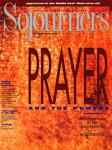I admit it. I'm a socialist. Have been for years. I've never been precisely sure what is meant by the word. I usually preface it with the descriptive "some kind of ..." And more often than not I've felt that it wasn't worth the trouble and confusion to attempt any use of the term in actual American discourse.
Even today when the question of political affiliation or inclination arises, I'll usually just identify myself as a Jacksonian Democrat. Which is true, as far as it goes. But when you get down to cases, I've always known that I was one. A socialist, that is. At least I have since I outgrew an adolescent attraction to anarcho-syndicalism.
For most of the past decade, my obscure sense of socialist identity has been symbolized by a quotation from Eugene V. Debs that hangs on my office wall. Debs was a railroad worker from Terre Haute, Indiana, who became a union organizer, and eventually the leader of the U.S. Socialist Party during its glory days at the beginning of this century, when it was a vital political force and a real contender for power.
The quote is above the computer screen, between the photos of Bob Marley and John Lennon, and beneath the picture postcard of Elvis Presley's grave. It says, "While there is a lower class I am in it, while there is a criminal element I am of it, while there is a soul in prison I am not free."
For me, the idea of socialism has never been an idea about forms of ownership, or currency exchange, or price administration. Instead it has been an idea that starts from that Debsian egalitarian impulse cited above and proceeds to ask the musical question, "Which Side Are You On?" For me, saying, even quietly, that I am a socialist has meant saying that I believe the destinies of human beings are joined one to another and that we will in fact be happier and freer together than we are apart.
As a socialist, I have breathed one heavy sigh of relief after another during the past year. Enforced, or colonial, socialism has fallen away in Eastern Europe. And the attack on repression and corruption has gained ground in the Soviet Union. The people who ran those so-called socialist countries finally have shown themselves to be what they always were -- a bunch of power-tripping opportunists. They are now, by and large, out of the way.
That may eventually make it possible again to use the term "socialism" and invoke the socialist tradition with head held high. At the very least these changes do open the way for the creation of some new thing that may or may not in the end call itself socialism, but which in fact embodies the best of the socialist vision.
A first draft of that post-communist and post-capitalist future is, of course, what Gar Alperovitz attempted in the July issue of this magazine. And it was that essay, and not an urge to confess my thought crimes, that started these musings on the "S" word.
I found Alperovitz's reflections helpful in their focus on core values -- i.e., democracy, equality, liberty, community -- as more important than instrumental panaceas such as free markets or worker ownership. When he did get instrumental, I found attractive the idea of community control of wealth-producing resources and the general downscaling of institutional size and scope. Those are, in part anyhow, essentially Jeffersonian ideas that I think reflect the best in American cultural traditions and deserve mainstream discussion.
Alperovitz's vision also moved me to what I hope are a couple of creative cultural quibbles. America is, in Martin Buber's phrase, "a community of communities. " But those are not necessarily geographic communities. To a growing extent, Americans identify themselves with self-selecting communities of culture -- from feminists and gays on through fundamentalists, computer hackers, gun nuts, or New Kids on the Block fans. Americans increasingly find their identity in cultural designations that bear only tangential relationship to either workplace or hometown. This is, of course, in addition to ethnic communities, which are likewise transregional.
These are communities of geographically dispersed minorities that are electronically linked, either literally through home-computer networks or 900 phone lines, or indirectly through the cultivation of shared electronic media experiences (especially music). So, in an electronic age, communities defined as geographic units are not necessarily the most accessible or attractive ones.
Of course, exclusive dependence on electronic communications and the community of shared media experiences for all non-home interaction is a poor substitute for face-to-face community. A redress of balance between the vicarious and ephemeral vs. the real and rooted is worth encouraging. But small-scale, geographically-centered community is no panacea either. It can, for one thing, be freedom's own worst enemy -- worse even than bureaucracy. Ask anyone who had to bust out of a small town, or an all-encompassing, smothering neighborhood enclave.
This is not to say that community control is a bad idea. It is simply to say what Alperovitz himself emphasized -- that there are no instrumental panaceas. It is also to emphasize the need for "progressives" (or whatever we call ourselves) to accept the American people and their culture where they are and to build upon the self-initiated experiences of liberty, equality, and community that they do have in their lives. This in large part means trying to build upon the way that people in their daily lives are able, against the odds, to use the instruments of popular culture as tools of self-definition and empowerment.
Danny Duncan Collum is a contributing editor of Sojourners.

Got something to say about what you're reading? We value your feedback!